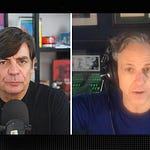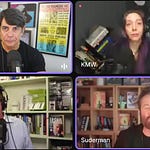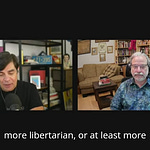Last fall, I participated in PopTech, one of the oldest tech-ish conferences around. It was founded in 1996 by Bob Metcalfe, inventor of Ethernet, and John Scully, the former CEO of Apple and Pepsi, and used to take place in Camden, Maine, which had become a playground for the technorati.
These days, it takes place in Washington, D.C., but it still works to serve as a place where people come to talk about the messy intersection of technology, culture, politics, and just about everything else too. Among the other people on the roster last year were hacker/investor Pablos Holman, free-speech historian
, futurist/philanthropist , and comedy writer/science communicator/ Sarah Rose Siskind (also my wife, by the way). Way back in 1998 (I think), I attended PopTech when my former boss at Reason, , had appeared along with other luminaries such as , founder of The Whole Earth Catalog, and Alan Kay, the father of the laptop.My short talk is above. You can also watch it on YouTube by scrolling down. It focuses on what I call “the agony of abundance,” or pessimism that follows not because of scarcity in goods, resources, and opportunities but in the face of abundance of the same. I think that the most overlooked reality is that for almost a decade now, a majority of people on Earth now live at or above middle-class living standards (I highly recommend reading The Rise of the Global Middle Class, by Homi Kharas of The Brookings Institution). That is not just an incredibly uplifting development, but a revolutionary. People whose wealth is increasing have a predictable habit of demanding more freedom in how they choose to spend their money and how they live. And yet at the same time we see people on the right and left assailing the concept of choice.
For much of the 21st century, the United States has been in a funk, for understandable reasons, including the busting of the tech bubble and the weirdly indeterminate 2000 election; the 9/11 attacks and the stupidity of the Global War on Terror and the busting of the federal budget; the financial crisis and subsequent bailouts and mostly useless stimulus spending; the weirdness of the 2016 election; the COVID pandemic—such a bizarre and odd timeline would throw even the most upbeat person for a loop or three.
National politics has been a dead heat for what Stanford political scientist Morris P. Fiorina calls a new era of no-decision, in which control of the White House, the House, and the Senate oscillates between the Republicans and Democrats in a way not seen since the end of the 19th century; terms like liberal and conservative are also up for grabs. Both the right and the left are casting glances backwards to periods when partisans believe everything was good and decent in America.
We’ve seen incredible growth in wealth and options across the board for larger and larger parts of most Americans. Far from having lower standards of living than their parents, Millennials and Gen Z are doing exceptionally well, especially when it comes to buying houses and making money.
But virtually all we do is complain, with large numbers of us thinking things were better 50 years ago. That is so wrong—and that’s what my talk is about. We are trying to solve existential problems—how do we live meaningful lives when presented with more choices than ever before—with politics. That way madness lies.
Let me know what you think.
Here’s the original YouTube version of my speech up on PopTech’s channel:









